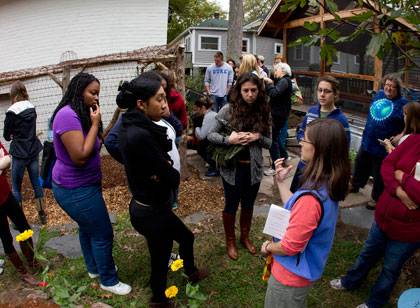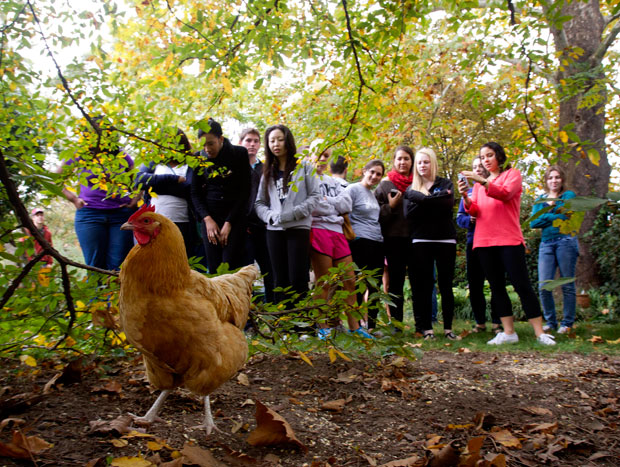Putting the Chicken Before the Egg
Duke students go on city chicken coop tour

Big Mama is depressed. The petite brown hen moped in a corner of the chicken coop at Duke Gardens while nearly 50 students circled around to learn more about urban chicken farming and Big Mama's brood of nearly half dozen.
Volunteer Pauli Hensen scooped Big Mama up while explaining to the group that a rooster had recently moved away and the sullen hen was grieving, or "going broody." Moments after being "loved on" by Hensen the hen perked up and began strutting with her hen sisters.
Duke students in women's studies professor Kathy Rudy's "Animals and Ethics" class were on their last stop of the self-guided Bull City Chicken Coop tour on Saturday afternoon. Earlier that morning the group boarded vans and visited three local, backyard chicken coops.
"The class was able to see the kinds of conditions the chickens live in," Rudy said. She recently showed students video of the living conditions of chickens raised on industrialized factory farms. "Now they're seeing the other side. Which place would you want your eggs to come from?"
The hens at the Gardens' chicken coop -- Marilyn, Mayflower, Porceilina, Baroness von Brody, Raptor and Big Mama -- live in a structure made of reclaimed wood from a tobacco farm. They dine on kale, cabbage and meal worms and get supervised (to protect them from hawks) playtime out in the yard. They each lay about an egg a day.
"They don't smell bad," said Sam Schloss, a New York City native who had never seen a chicken up close before.
On factory farms, most hens are raised in crowded conditions and slaughtered by the age of 18 months. Free range chickens raised in captivity can live almost as long as a dog.
"This really is the only way to ensure the eggs you eat are truly free range," said sophomore Erica Martin, noting that labels can be misleading. She'd asked one of the homeowners about how the fresh eggs tasted. "There really is such a thing as green eggs."
Durham recently lifted its ban allowing residents to have backyard chicken coops. No noisy roosters allowed. Residents, many of whom grow their own vegetables, must get their neighbors' permission, apply for a city permit and build the coop to the city's specifications.
"It's different from factory farms where they live in their own excrement," said sophomore Maggie Oliver, noting that one homeowner used a type of mulch infused with mushroom spores that eat the animals' waste. "Here's the right way to do it."
Senior Mitu Yilma had more practical concerns about the feasibility of low-income people growing food in their own back yard.
"I didn't realize how expensive it is to build a coop and raise hens," she said. "It costs money and time which is great for people who can afford it. But it might not help those who really need it, like people living in food deserts."
Below: Photo by Jon Gardiner/Duke University Photography
